- Home
- Patricia Highsmith
Those Who Walk Away Page 6
Those Who Walk Away Read online
Page 6
“Ah, signor, è troppo!” A wave of the hand, a laugh, but he accepted the money, and his face widened with his smile. He had a stubble of grey beard.
“It is not enough. A thousand thanks. Addio.”
“Addio, signor.” He shook Ray’s hand hard. “I wish you health.”
Ray turned and walked away, aware that two men paused briefly to stare at him. Ray did not look at them. He walked slowly, shook his clothes so they would not cling, and shivered violently. Everything looked shut. San Marco’s showed only two or three lights of places that were closed and cleaning up. Ray turned right, making for the Luna. But the Luna lobby was too big and open, Ray remembered; he would be noticed, asked his business. Ray veered suddenly into a small bar-caffé. There was a counter. He stood and asked for a cappuccino and a cognac. The cognac the boy poured was Stock. Ray did not like it, but was in no state to protest. While he waited for his coffee, a sudden hostility against Coleman rushed through him, as if the perilous events of the past hour or so had somehow held his emotions back. The sensation lasted only a few seconds, and ebbed as his strength had ebbed. He cupped his hand around the hot cup. The hollow-eyed boy behind the counter looked at him from time to time. Ray pulled the collar of his trench-coat straighter. It was a new trench-coat, waterproof, and it was beginning to look presentable. Only his shoes and trouser cuffs were a mess. Ray decided to go to a small hotel near by that might not insist on his passport, because his passport was at the Seguso. He had another cappuccino, another cognac, and bought cigarettes and matches. The iron door of the bar came down with a rattle and a bang. There was a smaller door in it through which he could get out, and a ring of keys dangled from its lock. Ray paid and left.
He saw the kind of hotel he wanted a minute later in a narrow lane, a blue-lit sign over its short, filigree marquee saying Albergo Internazionale or something like that. The decor of the lobby was imitation old-Venetian. At the bar to the left of the lobby, two Italians sat talking.
“You wish, sir?” The white-jacketed barman had come to the unattended desk.
“A room for one tonight?” Ray asked.
“With bath, sir?”
“Yes. Is the water hot?”
“Oh, yes, sir.”
A few moments later, he was in a small room by himself, empty-handed, without luggage. What had the boy said? You can register tomorrow morning. The manager has locked up the desk. He had given Ray the white card that hotel guests had to fill out for the police. Ray turned on the hot water in the tub, and smiled at the sight of steam rising. He undressed and eased himself into the water, which he had been careful to make not too hot. He began to feel sleepy, or faint, so he got out and dried himself as briskly as he could with a smallish towel. There was an enormous towel hanging folded on a rod, but Ray had not the energy to deal with it. Then he hung up his clothes with some care, slowly because he was exhausted, and got naked between the sheets. His throat was already sore, and he did not know what he was in for.
In the morning, he sat up, blinked, and realized where he was. He had slept with the light on. He turned it off. His throat was fiery now, his head light and empty as if he might faint. He was frightened, and not merely because he might have pneumonia. It was a nameless, vague fear that he had, combined with a sense of shame. His trousers were still wet. He looked at his wrist-watch—still running because it was waterproof-and saw that it was 9.20. A small plan came to him, so small he felt moronic for finding pleasure in it: he would order breakfast, have his suit pressed, and try to sleep again while they were pressing it. He put on his trench-coat, which was only slightly damp in its lining, and picked up the telephone and ordered. He felt a lump inside his coat, up on the right, and recalled that his book of Traveller’s Cheques was in the buttoned pocket there. He pulled them out. What luck that he’d put them there, left them there, rather, after buying them in Palma. Two thousand dollars’ worth of hundred-dollar bills. There was a smaller book of Traveller’s Cheques in his pensione, left over from Xanuanx days, only a few hundred in it, Ray thought. He flattened the book of cheques out. He had signed them in India ink with his fountain-drawing-pen, so the signatures were intact, but the pages were stuck together. He laid the book on the four-barred radiator.
His breakfast tray arrived, and Ray sent the girl away with his damp suit and also his shirt. She looked a little surprised, but said nothing.
After his breakfast, he filled out the card with a made-up name and passport number, because he felt for some reason ashamed to write his own.
He was awakened at eleven, when his suit was brought back. He hung the suit in the closet and went back to bed, thinking to wake up around one, leave the hotel, and have a good lunch somewhere. He awakened at a quarter to one, and got dressed. He had no tie and he could use a shave, but those things could be easily remedied. Ray stood at his window, which looked out on to tile roofs and a few tree-tops and vines in people’s gardens, a view that might have been Florence or several other Italian towns, and again he felt the nameless, paralysing fear, a sense of helplessness and defeat. You might have been dead. How is it you’re alive? Ray squirmed under his jacket. He had almost heard the voice. And once more, Coleman probably thought he was dead. Once more, Coleman didn’t give a damn, wasn’t very interested in whether he was alive or not. Because you simply don’t matter. Ray forced himself to think what he had to do next. Pay the bill here. He didn’t want to go back to the Seguso. That was it. Play dead for a few days. See what Coleman would do. The thought brought a curious relief. It was a kind of plan.
Downstairs at the desk, he asked for his bill. Number eight-four. The name, Thompson. Ray handed in his card. He paid the four thousand, six hundred and sixty lire. No passport was asked for. Ray went out the hotel doors and was immediately aware of the fact he did not want to run into Coleman. Or Inez, or Antonio. He regretted not having looked out through the glass doors before going out, and now he walked stiffly and glanced at people so frequently that a few eyes were attracted to him, so he made himself stop that. The shops were beginning to close for the long midday break. Ray went into a shop and bought a pale blue shirt and a blue-and-red striped tie. There was a cubicle for trying on clothes, and he put on the new shirt and tie in there.
Warily, Ray walked into the street the Hotel Bauer-Gruenwald was on, and turned left, away from the hotel. No Coleman, no Inez, only streams of strangers who paid him no attention. Ray went to a trattoria called Citta di Vittorio, too modest a place for Inez and Coleman to go to, he thought, but still he looked around as he opened the door. He had bought a newspaper. Ray had a slow lunch, ate all he could, but failed to finish what he had ordered. His cheeks felt hot, and his face had been pink in the mirror at the haberdasher’s. Unfortunately, he was about to be ill. It was curious to think that he might now have something that would prove to be fatal, Coleman’s follow-up blow. He debated going to a doctor for a shot of penicillin. I fell into a canal last night and…
Ray went to a doctor about four o’clock, in a dusty old building in the Calle Fiubera behind the Clock Tower. The doctor took his temperature, said he had a fever, would not give him penicillin, but gave him an envelope of large white pills and told him to go home and to bed.
The day was grey and cold, but it did not rain. Ray walked to the tailor’s shop where he had left his overcoat to be repaired, and picked the coat up. It seemed a strange transaction like one life invading another, or a bridge between two existences, the overcoat. But Coleman’s bullet-holes were gone, erased, the overcoat was like new, and he put it on. It was a good silk-lined coat from Paris. He went into a bar for a caffé and a cigarette. He had to think what to do, because the night would come soon. With a glass of water, he took two of the huge pills, tilting his head back to get them down. He remembered being ill once in Paris, when he was a child, being given a large pill to swallow, and asking the doctor in French, Why is this so big? “So the nurses won’t drop them,” the doctor had said, as if it were self-evident, a
nd Ray still recalled his shock and sense of injustice that a nurse’s fingers should be thought of before his own throat. The doctor here had told him six per day. With the delicious, inspiring caffé, Ray felt full of ideas and anything seemed possible. He might strike up an acquaintance with a girl, tell her an interesting story, be invited to her flat, be allowed to stay, especially if he gave her some money. Or he could pick up some Americans, tell them he was hiding from a girl, an Italian girl who was inquiring at every hotel in Venice for him. But he realized the difficulty of finding Americans who (a) had a flat or a house in Venice and (b) would be Bohemian enough to take in a stranger. Ray thought again, and tried to be more logical. For the third time, the peach-faced girl in the bar-caffé north of the piazza came to his mind. A nice girl, that was evident. He would have to tell her a decent story. The nearest to the truth was best, or so he had always heard. He could ask her a perfectly honourable question: did she know of any place, any family, any person who would take him in for a few days, if he paid them rent? Private houses would not ask for his passport, because they did not report their income from lodgers.
Ray left the bar, and went in search of a barbershop. In the barbershop—where a ten-year-old boy lay sprawled on a bench with a transistor, enraptured by some quite good old-style American jazz—Ray asked the barber to leave the beard along his jawbone and his upper lip. He was not trying to change his appearance, and the beard wouldn’t do so to any extent; he simply wanted a change. He had grown such a beard in Mallorca for a few months. Peggy had liked it at first, then she had not liked it, and he had shaved it off. The barber’s mirror was long and clear, covering half the wall. Ray looked directly at himself over the double row of bottles of hair tonic and lotions, his eyes burning now in a fine frenzy of fever, he supposed, but they seemed very steady.
He had heavy dark brown eyebrows, a wide straight mouth, the lips more full than thin. His nose was strong and straight, a heavier version of his mother’s, but in his mother it had been a final asset that made her ‘a beauty.’ His red-brown hair was not in his parents, but had been the hair colour of his mother’s brother Rayburn, for whom he was named. When Ray received letters addressed to Raymond Garrett, he knew whoever had written did not know him well. From his father, an oilwell worker in his youth, a self-made man, now a millionaire with an oil company of his own, Ray had inherited wide cheekbones. It was an American face, slightly on the handsome side, hopelessly marred by vagueness, discretion, the second thought, if not downright indecision, Ray thought. He disliked his appearance, and always saw himself leaning slightly forward as if to hear someone who was speaking softly, or as if incipiently bowing, kowtowing, about to retreat backwards. And he felt that because of his parents’ money, he had had life too easy. It was still un-American to take money from one’s parents. Among his friends, lots of them painters without much money, Ray was inclined to pick up any tab, but this also was forbidden: it was showing off. He was afflicted by a constant feeling that he was not in the mainstream of life, because he did not have to hold a job. With friends, he divided bills rather too pointedly, perhaps, and each paid his share, except when he had had a couple of drinks and was able to do what he felt like, which was to say, “This is on me.”
Sitting in the barber’s chair, Ray recalled a childhood incident which stood out absurdly, and returned to him at least twice a year. When he was nine or ten, he had stayed in the house of one of his school friends, an apartment house. He had realized that his school friend’s parents didn’t own the apartment, only rented it, and that other people had lived there before them and would live after them. He had spoken to his father about it that evening, saying, ‘Our house always was ours, wasn’t it?’ ‘Of course, I built it,’ said his father. (Ray had thought then, his father might have built it with his own hands before Ray was born, because his father could do anything.) Ray had felt different then, rather special, but in a way that he did not want to be. He had wanted to live in a house or an apartment in which other people had lived before. He had felt that it was vaguely unfriendly and arrogant of him and his family to live in a house they had built themselves and owned. The apartment of his school friend had been by no means a shabby one, but rather luxurious. But years later, even into the present, the sight of a row of brownstones in New York, of ordinary house-fronts here in Venice, brought back the incident to him, and the same disquieting emotion: other people lived somehow in layer upon layer of humanity and history; his own family had a thin but rich new surface. Therefore there was, somehow, nothing for him to stand on.
At twenty, while going to Princeton, Ray had become engaged to a St Louis girl whom he had known since he was eighteen. He had thought he was in love with her, but he hardly knew how the engagement had happened. Of course, he had done the proposing, verbally, but in a way the girl had, and both their families had exerted pressure simply by ‘approving.’ A year later, just before graduating, Ray had realized he didn’t love her at all, and he had had to break it off. The experience had been traumatic. He had barely passed his examinations. He had felt a heel, thinking he had wrecked the girl’s world, and one of the happiest moments of his life had been just after graduating, when he heard that the girl had got married. He really hadn’t hurt her at all, he realized. His patents, Ray thought, hadn’t had an inkling of what he had gone through that last year in university, though they took great interests in his grades, and whom he knew, and whether he was ‘happy and doing well.’
He listened—with more pleasure than he usually listened to jazz, which in Mallorca had nearly driven him mad—to the free and easy expertise coming from the boy’s transistor, music that the plump barber cutting his hair now, and the other two barbers and the men in the chairs, seemed not to hear at all, and Ray felt that anything in the world that he wished might be possible. It was, theoretically, possible and true. Yet he realized also that he lacked the dash to make any of it come true, and that the thought had come to him because of the jazz and because of his fever. He was timid, quite unlike his father whose word was law and who did what he wanted to do, or what needed to be done, in one slashing stroke. Ray wanted his self-effacement, which even sometimes caused him to stammer with strangers. He detested his money, but there were always places to get rid of it, and Ray was using them—helping to support a couple of painters in New York, anonymous gifts (small compared to millionaires’ gifts, but he hadn’t come into his father’s money as yet) to broken-down churches in England, to relief committees for Italian and Austrian villages buried under landslides, to a couple of organizations for the improvement of racial relations. Ray could have had even more money. He had instructed his trust fund bankers to send him a sum he considered adequate; but because he did not use all his income, money was piling up in the trust fund, making more daily, despite the whacks of income tax and his occasional request for five thousand dollars for a car, ten thousand for the boat he and Peggy had bought in Mallorca.
When he left the barbershop, he walked in the direction of the bar-caffé near the Campo Manin. It was after five o’clock and growing dark. The girl might not be working now, Ray thought, if she started so early in the morning.
He found the bar-caffé, and she was not behind the counter. Ray felt very disappointed. He stood at the counter and ordered from the small boy a cappuccino he did not want. He debated asking the boy about a room somewhere. Italians were very helpful about such things, and the boy looked bright, but Ray could not bring himself to risk it. The boy might tell other people. Then the blonde girl in her pale blue uniform came in through a door at the back of the shop. A slow shock went through him at the sight of her, and he looked down at his cup; but his eyes had met the girl’s, and she said with a smile, “Buona sera,” as she must have said to two hundred people that day.
She served two men who had come in. Glasses of red wine at the counter.
He should speak before it became any more crowded, Ray thought, and began to form his sentences in Italian. When the
girl was dunking cups into the sink of hot water directly before him, Ray said, “Excuse me. Do you know of a house in the vicinity where I might rent a room? It is not necessary that it be in the vicinity.”
“A room?” she asked, her grey eyes wide. Then her eyes closed half-way as she thought, wet dishcloth in left hand on the chromium sink edge. “The signora next door to me. Signora Calliuoli. In the Largo San Sebastiano.” She pointed.
The direction meant nothing to Ray. “Can you tell me the number?”
The girl smiled and looked bewildered. “It’s a long number and there is no name on the bell. If you want, I will show you when I leave. If you want to wait”—a glance over her shoulder—“I finish at six.”
It was seventeen minutes to six. Ray finished his coffee, paid, and left a tip in the saucer on the bar. He nodded to the girl, trying to look efficient and proper, said “Until six,” and went out of the bar.
The Signora Calliuoli might not have a room free, he thought, in which case the girl might not know of another place. But Ray felt carefree and happy, actually happy, and realized at once that it was due to fever and quite specious. He turned up at the bar-caffé on the dot of six.
The girl was putting on a black cloth coat. She gave him a smile and a wave. A heavy-set young man in a white mess jacket came from the door at the rear, perhaps to take the girl’s place for the evening, and she spoke to him, too, eliciting a smile from him and a glance at Ray.
“It’s not far. Four minutes,” said the girl.
Ray nodded. He wanted to tell her his name, for politeness’ sake, then realized he had to make up a new one. “My name is Philip. Filipo. Gordon,” he added.

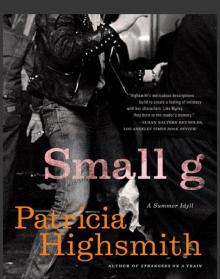 Small G: A Summer Idyll
Small G: A Summer Idyll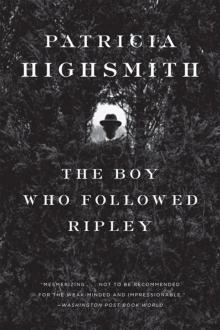 The Boy Who Followed Ripley
The Boy Who Followed Ripley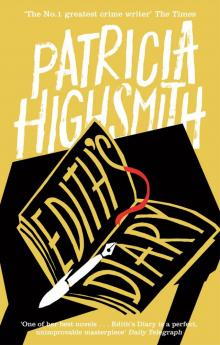 Edith's Diary
Edith's Diary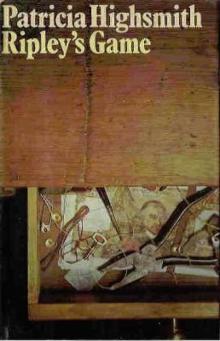 Ripley's Game
Ripley's Game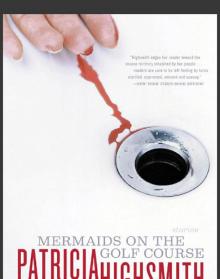 Mermaids on the Golf Course: Stories
Mermaids on the Golf Course: Stories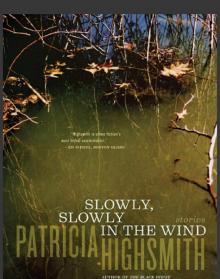 Slowly, Slowly in the Wind
Slowly, Slowly in the Wind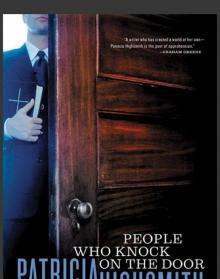 People Who Knock on the Door
People Who Knock on the Door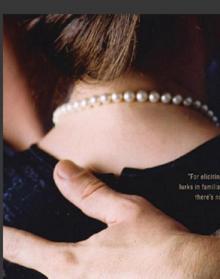 The Glass Cell
The Glass Cell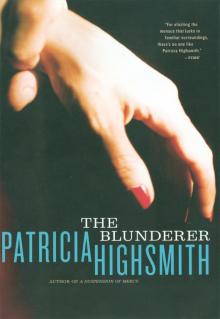 The Blunderer
The Blunderer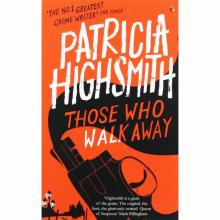 Those Who Walk Away
Those Who Walk Away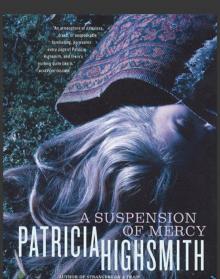 A Suspension of Mercy
A Suspension of Mercy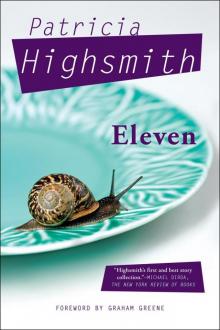 Eleven
Eleven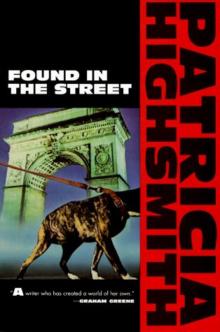 Found in the Street
Found in the Street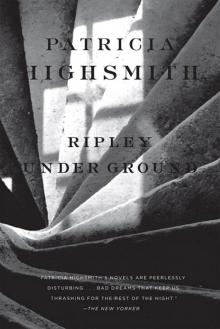 Ripley Under Ground
Ripley Under Ground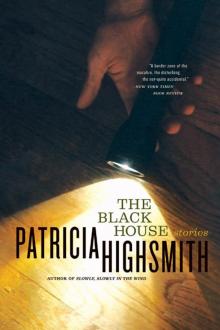 The Black House
The Black House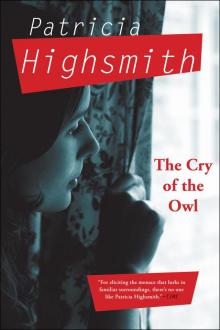 The Cry of the Owl
The Cry of the Owl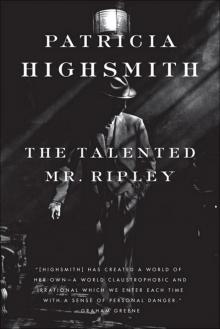 The Talented Mr. Ripley
The Talented Mr. Ripley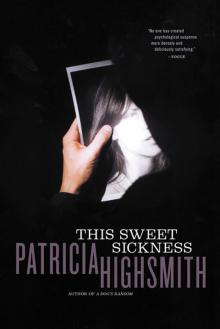 This Sweet Sickness
This Sweet Sickness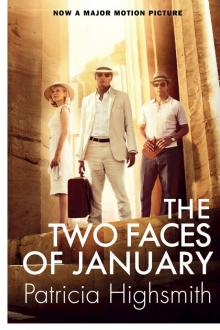 The Two Faces of January
The Two Faces of January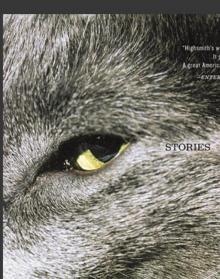 The Animal-Lover's Book of Beastly Murder
The Animal-Lover's Book of Beastly Murder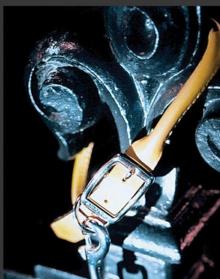 A Dog's Ransom
A Dog's Ransom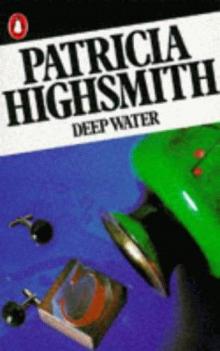 Deep Water
Deep Water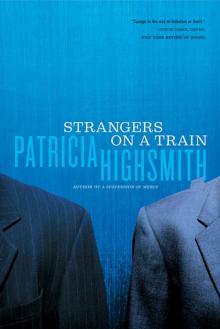 Strangers on a Train
Strangers on a Train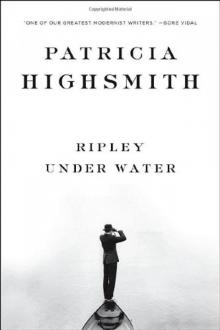 Ripley Under Water
Ripley Under Water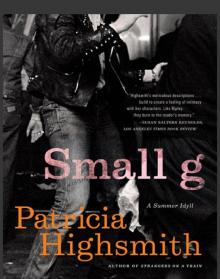 Small g
Small g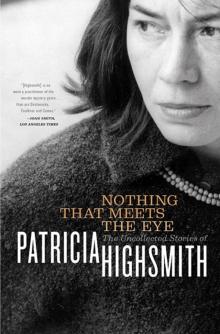 Nothing That Meets the Eye
Nothing That Meets the Eye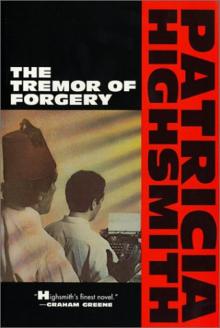 Patricia Highsmith - The Tremor of Forgery
Patricia Highsmith - The Tremor of Forgery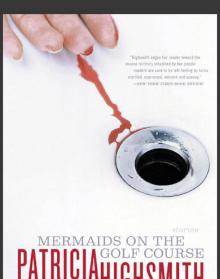 Mermaids on the Golf Course
Mermaids on the Golf Course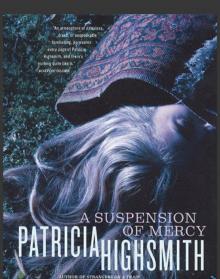 Suspension of Mercy
Suspension of Mercy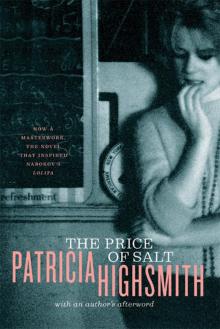 The Price of Salt, or Carol
The Price of Salt, or Carol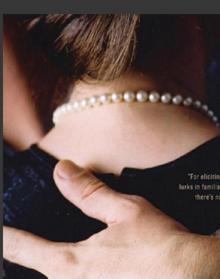 Glass Cell
Glass Cell